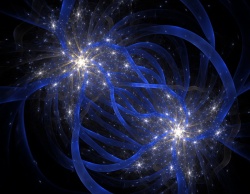Difference between revisions of "Anava"
Jump to navigation
Jump to search
(Created page with "thumb|250px| Anava (from "anu", meaning an atom or an exceedingly small entity) is a state - the consciousness of the ego, the sense of "I" and "mine". Thi...") |
|||
| Line 1: | Line 1: | ||
[[File:String.jpg|thumb|250px|]] | [[File:String.jpg|thumb|250px|]] | ||
| − | Anava (from "anu", meaning an atom or an exceedingly small entity) is a state - the consciousness of the ego, the sense of "I" and "mine". This represents a sense of individuality and a separation from a general existence of any "divine plan". One of the three Buddhist malas or bondages: anava, karma and maya. The three malas or pashas are also explicitly discussed in the theology of Shaivite Hinduism. In Shaivism, anava is the cause of the individual soul's mistaken sense of separate identity from Universal God Siva, and the last bond broken before union or Self-Realization (moksha). | + | [[Anava]] (from "anu", meaning an [[atom]] or an exceedingly small entity) is a state - the [[consciousness]] of the [[ego]], the [[sense]] of "I" and "mine". This represents a [[sense]] of {{Wiki|individuality}} and a separation from a general [[existence]] of any "divine plan". One of the three [[Buddhist]] malas or bondages: [[anava]], [[karma]] and [[maya]]. The three malas or pashas are also explicitly discussed in the {{Wiki|theology}} of Shaivite [[Hinduism]]. In {{Wiki|Shaivism}}, [[anava]] is the [[cause]] of the {{Wiki|individual}} soul's mistaken [[sense]] of separate identity from [[Universal]] [[God]] Siva, and the last bond broken before union or Self-Realization ([[moksha]]). |
{{W}} | {{W}} | ||
Revision as of 19:27, 25 August 2013
Anava (from "anu", meaning an atom or an exceedingly small entity) is a state - the consciousness of the ego, the sense of "I" and "mine". This represents a sense of individuality and a separation from a general existence of any "divine plan". One of the three Buddhist malas or bondages: anava, karma and maya. The three malas or pashas are also explicitly discussed in the theology of Shaivite Hinduism. In Shaivism, anava is the cause of the individual soul's mistaken sense of separate identity from Universal God Siva, and the last bond broken before union or Self-Realization (moksha).
